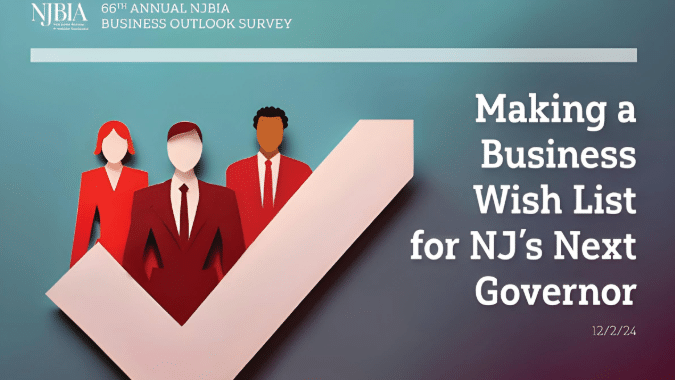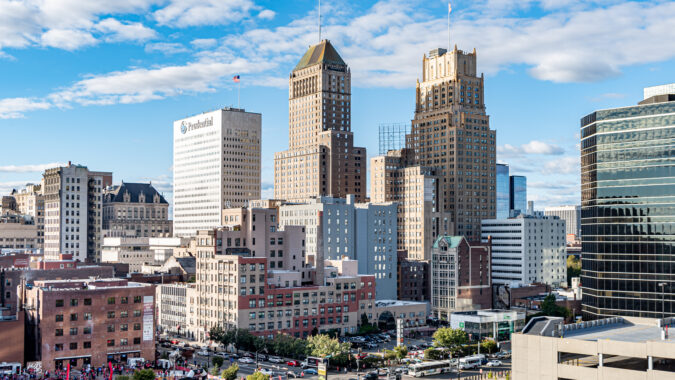While the state is less than a year away from electing a new governor, New Jersey businesses already know what they’d like to see from him or her after Gov. Phil Murphy completes his second term in office.
In NJBIA’s 66th Annual Business Outlook Survey, high-level business representatives were asked to list the top three actions, in order, a new governor could take to have the greatest positive impact on their business.
And with 23% listing it as their top priority, lowering property taxes was No. 1 on the wish list among all respondents.
“That a reduction in property taxes is desired by New Jersey businesses isn’t necessarily surprising, but the idea that they never seem to be in the conversation for property tax relief by policymakers is,” says NJBIA President and CEO Michele Siekerka.
“New Jersey businesses have been excluded from any property-tax reductions from the ANCHOR and Stay NJ programs, even though they pay nearly half the property taxes in the state annually. A new governor clearly has the opportunity to endear themself to our job creators by finding them some much-needed property tax savings.”
As part of the respondent’s wish list:
- More than 53% of respondents listed property tax relief in their top three.
- Reducing health insurance costs was cited in the top three by 51%, including 15% who listed it as their top want.
- 40% listed lowering corporate taxes in their top three, including 16% who made it their first wish.
In 2024, Murphy returned New Jersey to the top corporate income tax rate in the nation (11.5%), reversing his 2023 commitment to lower it.
Affordability Concerns
Employers also continued to be extremely disappointed by business affordability in the state.
This year, 74% said no to the same question – compared to 68% in 2023.
Further, 79% said business affordability has decreased in New Jersey over the past five years, compared to only 4% that said it has improved in the same time frame. Seventeen percent said business affordability has remained the same over the past five years.
“Business affordability unfortunately does not seem to get any meaningful traction with policymakers,” Siekerka says. “It’s our hope that a new regime in Trenton will recognize the extreme costs of doing business in the state, taken as a collective, and consider policies to improve this sobering trend.”
Inflation Impacts
While the nation’s inflation rate leveled off in 2024, New Jersey businesses still felt the pinch and then some – with 46% saying they were substantially impacted by inflation, compared to 36% in 2023.
Another 42% said they were moderately impacted by inflation in 2024.
With supplies and materials, 57% said they were substantially impacted by inflation – compared to 51% in 2023.
Similarly, 48% said they were substantially impacted by inflation for labor costs in 2024, compared to 40% in 2023.
Staffing
For the second straight year, 55% said they were challenged to find appropriate staffing – an improvement from a 70% total in 2022.
Of those who were challenged to find staff, 77% said there were not enough candidates or applicants to fill open positions, while 68% said candidates lacked the required skills or qualifications.
Employment
New Jersey businesses saw a slight decrease in hiring levels in 2024. About 20% increased hiring this year, compared to 23% in 2023. Another 20% decreased hiring.
That’s a net-zero hiring number for 2024.
Looking to 2025, 28% predicted they will increase employment, compared to 10% which predicted less hiring – an +18% net positive hiring outlook. Sixty-two percent said they’ll stay about the same.
Sales
Actual sales for New Jersey businesses took a step back in 2024, with 39% claiming an increase in sales this year. That’s 12 percentage points less than 2022.
Forty-eight percent of businesses projected an increase in sales for 2025 – which is higher than the 43% forecast of increase in 2024.
That’s compared to 19% who foresee less sales next year. Overall, that’s a +29% net positive forecast for sales. A year ago, that net positive outlook for sales was only +17%.
Purchases and Prices
For the second straight year, a total of 61% said prices for their products and/or services increased in 2024 (13% increased substantially, 48% increased modestly).
Only 3% said they decreased prices this year.
Regarding future purchasing plans, 45% are expecting to increase the dollar value of their purchases in 2025 and 16% are anticipating a decline. That’s a net positive of +29% for next year, compared to the 17% net positive outlook for 2024.
Challenges
For the fourth straight year, the overall cost of doing business was listed as the most troublesome problem for New Jersey businesses – with 23% listing it as tops among their Top 4.
Availability of skilled labor was second (15%), followed by health insurance costs (14%), and property taxes (13%).
Extremely consistent with recent years, 81% of respondents said they expect their health benefits costs to go up in 2025. Of those, 27% anticipated those health benefit costs to rise 11% or more in 2024.
As for local property taxes, 72% expected an increase, 27% expected them to remain the same, and only 1% expected a decrease.
New Jersey’s Competitive Levels
The leading competitive positive for New Jersey: 46% rate the quality of New Jersey public schools to be better than other states. At protecting the environment, 26% said New Jersey does better than other states – a 2% bump from last year.
Another notable positive – 28% said the quality of New Jersey’s workforce was better than other states.
For a second straight year, 15% said the state does a better job in promoting economic development.
New Jersey continues to struggle in many areas more tied directly to business. It was listed as worse than other states in taxes and fees (85%) and controlling government spending (70%).
Wages
Despite business challenges, New Jersey employers continue to attempt wage increases.
All totaled, 77% increased wages in 2024.
Looking ahead to 2025, 16% say they’ll increase wages more than 5%.
Another 37% said they’ll raise wages between 3% and 4.9% in 2024. All totaled, 74% said they’ll increase wages in 2025, while 24% anticipate no change in wages.
Profits
From 2012 to 2019, more New Jersey businesses reported more gains than losses in this survey.
That all changed during the pandemic year of 2020 and the climb from that hole continues.
In 2024, only 32% of respondents reported profits for the year, 4% fewer than in 2022. At the same time, 45% reported a loss.
This continues to be a key reason why NJBIA uses a mantra to Trenton lawmakers that “every dollar counts” when informing on policy.
Businesses’ outlook for profits is a little better than a year ago. In 2025, 40% believe they will make a profit, compared to 25% who anticipate losing money. That net positive of 15% certainly isn’t a strong number historically in this survey, but it’s better than the 9% net positive outlook for 2024.
Of the 40% hoping to be on the plus-side for 2025, 14% are forecasting profits of only 1% to 3%.
New Jersey’s Economic Climate
When respondents were asked about the current business conditions in their industry, 34% said they were experiencing a slowdown (5 percentage points more than last year), while 15% said they were experiencing an expansion.
Eight percent said their industry was moving from a slowdown to a recovery, while 5% said they were moving from an expansion to a slowdown. A majority (38%) said business conditions in their industry were staying the same.
As a location for new or expanded facilities, 28% listed New Jersey as very good or good. Another 32% described the Garden State as fair, and 39% ranked it as poor.
Only 14% said they believe New Jersey has made progress over the last year in easing regulatory obstacles. That number has declined steadily from 24% in 2017.
When asked if their business had postponed installation of equipment or any expansion due to delays in permitting or a regulatory process, 12% said yes.
Sixty-two percent said they made investments to improve productivity in 2024.
The needle is moving in the right direction on New Jersey’s appeal for people in their golden years, with 46% saying they are planning to keep New Jersey as their domicile in retirement. That number is up 14 percentage points from four years ago and is the highest it has been in a decade.
Economic Outlooks
The economic outlooks for New Jersey and the nation are much more optimistic than in recent years.
Most (37%) rated New Jersey’s economy as fair, but 31% said it was poor – which is 13 percentage points more than last year. Meanwhile, 28% ranked the state economy as good and only 4% said it was excellent.
When asked how New Jersey’s economy will fare in the first six months of 2025, 23% said it would be better. A year ago, only 14% reported it would be better. Further, only 26% said it would be worse for the first six months of 2025, compared to 45% who said it would be worse a year ago looking ahead.
That’s only a -3% net outlook, much improved over the last two surveys (-31% net negative outlook for 2024 and -36% outlook for 2023).
Most (63%) rated the US economy as fair (37%) or poor (29%).
Looking ahead, only 25% said they believed the US economy would perform moderately worse (18%) or substantially worse (7%) in the first six months of 2025.
A year ago, that combined number was 47%.
About The Survey
Questions for NJBIA’s 66th Annual Business Outlook Survey, conducted in partnership with Signet Research of Englewood, were sent to New Jersey business owners and executive staff in September and October 2024. The report is based on 620 valid responses. Most respondents were small businesses, with 66% employing 24 or fewer people. Complete results for any survey question allowing a single response may equal slightly more or less than 100% due to calculations made before rounding. NJBIA's Business Outlook Survey art and graphics were produced by Mike Sanchez, Creative Director, New Jersey Business Magazine.
NJBIA's 66th Annual Business Outlook Survey is the cover story in the December issue of New Jersey Business Magazine, which can be found here.




